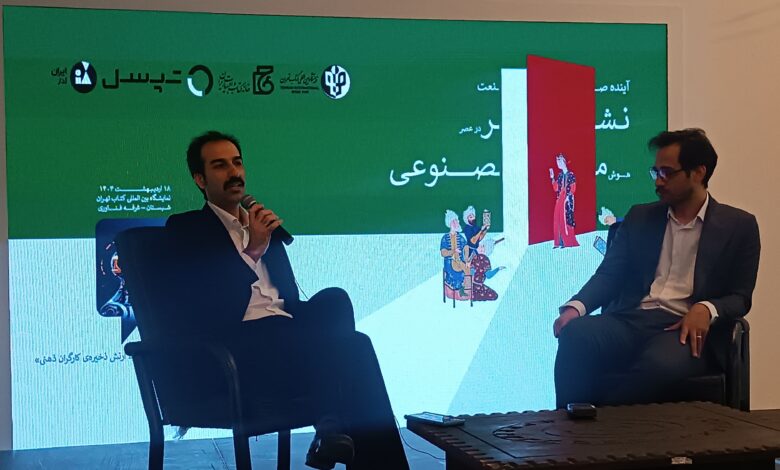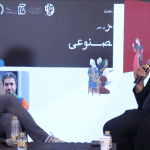The Publishing Industry Meeting in the Age of AI was held in the Publishing Technologies Hall with the presence of Reza Nassaji, Director of Mardomnegar Publishing. The Publishing Technologies Hall hosts specialized meetings in the field of books and reading at the 36th Tehran International Book Fair.
According to Ideaagency, in this meeting, Reza Nassaji, in a conversation with Sadegh Attarzadeh, stated that we do not fundamentally consider ourselves workers in cultural work, and pointed out the following: “We need to become familiar with the concept of the intellectual worker in the field of books, a worker who works with unstable working conditions and low wages. There is exploitation in this field, precarious workers (proletariat) are freelancers, and long-term, long-term work does not make sense in Iran. In this situation where there is no mutual understanding in the publishing industry, I do not see a positive outlook for AI.”
This publishing activist explained the importance of book selection: “Who is responsible for selecting a book for publication? It is a human and important issue. In this field, the publisher does not make a choice based on her own taste. The choice begins with a human who has thoughts and concerns. The relationship between the selector and the book producer and the consumer is a relationship that AI can enter and achieve.”
Nassaji admitted: “An editor at a publishing house or an employer makes a selection for translation. A book is originally written, and the publisher selects the book based on its relationship with Iranian society and hands it over to AI. The publisher explains its importance to Iranian society and the audience in the introduction and conclusion.
He is the one who provides footnotes for the sentences. Even how to provide footnotes is the basis for selection. The publisher determines which types of literature are unknown or misunderstood in Iran. They even check to see if there is any connection to Iran. For example, the topic of utopia in Iran. We decided to write about utopia, because the previous books we published on this subject were not so well received, so I had to start with an introductory book on the subject, and we will provide an explanation by providing a Latin footnote.”
He added: “All of these are human processes, from what level to start, what level to consider the audience, and giving the book to a translation and editing specialist. Now, let’s assume that if the publisher wants to eliminate all of these processes and replace them with AI, it will abandon the human process, including the pen, signature, knowledge, and brand of the translator and editor.
If we only want to have a commercial book, we must set aside the first-rate translator with his financial expectations and concerns such as revisions or the need to become more familiar with the book. When we hand over the translated work to AI instead of a proofreader and editor, we eliminate groups and take the book away from the author. In this situation, it’s as if we’re eliminating the author altogether!”
The director of Mardomnegar Publishing, pointing out that by using AI and eliminating processes, various professions are lost, said: “By eliminating various professions, individuals are not given the opportunity to grow. Translators and editors will step aside and professions will become unemployed, professions that do not have a trade union, do not consider their activities common, consider each other as competitors and do not recognize each other. This process is a kind of formalist mentality where we eliminate the semi-skilled and skilled worker and the art becomes an industry. By replacing the proofreader and translator, the work is simplified and done by machines.”
Nassaji noted: “We are separated from the knowledge system in the world, we are isolated and we see ourselves as needy of the world. We buy the products of knowledge or we take them without permission. Whatever technology exists in the world, we are its consumers and so is the book. What is required in such conditions is to give importance to art and literature, which we ignore like sanctions, including the knowledge system. We are also far from the latest achievements in the humanities, philosophy, and sociology.”
He continued: “We are not using AI to help us get out of this situation, as a result, it is taking us backward and we are losing the relationship it could have with society and the humanities. We are losing it for the sake of saving and short-term benefit of publishers, regardless of whether they have a short-term investment and a longer-term perspective.”




No Comment! Be the first one.